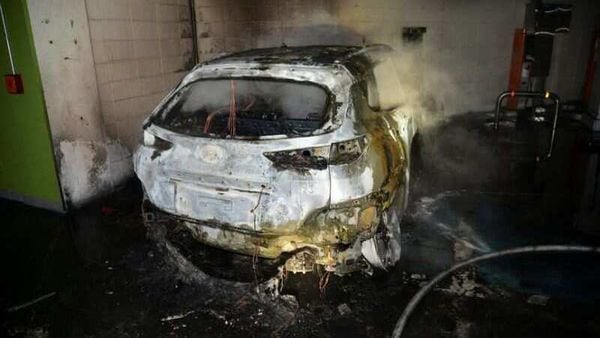US carmakers urged to improve EV fire response guides


The National Transportation Safety Board (NTSB) urged automakers on Wednesday to improve electric vehicle emergency response guides that lack clear information and hamper efforts to extinguish lithium-ion battery fires.
The recommendations follow a series of NTSB investigations into four Tesla electric vehicle battery fires on US roads in 2017 and 2018, including three high-speed crashes in which the lithium-ion battery reignited after firefighters extinguished fires.
Also check these Vehicles
NTSB said "most manufacturers’ emergency response guides for fighting high-voltage lithium-ion battery fires lack necessary, vehicle-specific details on suppressing the fires."
Tesla and a group representing nearly all other major automakers did not immediately comment.
The agency added that "in addition to hampering efficient extinguishing of high-voltage lithium-ion battery fires, the lack of clear, vehicle-specific firefighting information can lead to confusion or inadvisable action on the part of first responders."
Tesla previously argued EVs are safer than gasoline-powered vehicles and said data showed EV owners are far less likely to experience a car fire than gasoline-powered vehicles.
In 2018, there were 212,500 US vehicle fires that caused 560 deaths, the National Fire Protection Association (NFPA) said. Gasoline ignited in more than half of all vehicle fire deaths. NFPA said existing data collection systems have not yet adequately captured the frequency of EV fires.
NTSB urged the National Highway Traffic Safety Administration (NHTSA) to incorporate manufacturer’s response guides scores into its New Car Assessment Program.
NTSB also urged NHTSA to convene stakeholders to continue research "on ways to mitigate or deenergise" risks from high-voltage lithium-ion batteries and to reduce hazards after high-speed EV crashes.
A NHTSA spokesman did not comment. The agency said Friday it was establishing its Battery Safety Initiative for Electric Vehicles to coordinate research and other efforts.
In November, General Motors recalled 68,677 electric cars after five reported fires and two minor injuries. The recall for fire risks covered 2017-2019 model year Chevrolet Bolt EVs.
In October, Hyundai Motor Co recalled nearly 77,000 Kona EVs, saying possible defects in battery cells increased the risk of a short circuit or fire.








 39.2 kWh
39.2 kWh 452 km
452 km















